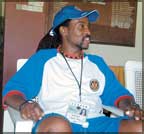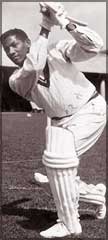|
dailynews |
|
|
|
OTHER PUBLICATIONS |
|
|
|
OTHER LINKS |

|

|

|
|
Cricket has another Basil Butcher
|
|
|
Joining Butcher in the run parade were Clive Lloyd and skipper Garry Sobers who both completed centuries. This was after Ceylon as it was then known had run up an impressive total of 400 mainly through a last wicket stand of 110 in 53 minutes between Neil Chanmugam (72) and Ian Pieris (46 n.o.).
The article here is not about what happened nearly 40 years ago, but centres around another individual who carries the same name as Basil Butcher.
The person we are talking of is his son Butcher junior who is presently in Sri Lanka as the assistant coach of the United States under 19 cricket team taking part in the ICC under 19 World Cup.
|
|
Butcher Jnr was born in England but has been living in the USA for 25 years. How he ended up there instead of following in the footsteps of his famous father was because according to him "cricket was not the first choice, getting an education was more important".
It was not that Butcher Jnr was not interested in cricket. He played for Guyana in the junior age groups and even went for trials to get into the first team, but that was as far he went. He left Guyana at the age of 16.
Butcher Jnr is a highly qualified corrector and performance exercise coach which involves dealing with sportsman who gets injured to the ones who want to improve their performances.
"The certification for this profession that I did is the most rigorous exercise in the USA if not in the world. It's an advanced certification which has four levels. It took me four years to finish.
There are only 22 of us in the world with this qualification," said Butcher Jnr. When Butcher Snr came to know that his son was coming to Sri Lanka with the USA cricket team he told him: "There will be a garrison of people in Sri Lanka. Get yourself around and expose yourself. My name will help you somewhat."
"My father told me that even at that time he could see that you had talented players.
"Before the 1966 tour Garry sobers had come here as a coach and when he went back to the Caribbean he told them that Sri Lanka had some exciting young players.
When my father came and played against you guys he saw for himself. He was not surprised that you guys became a Test country and have been successful. You had very good players who graced world cricket," said Butcher Jnr.
Being the son of a famous father has its advantages and disadvantages. Butcher Jnr describes it as a "double edged sword".
"On the one hand because who my father was guys would right away say we want him to play. However the other end was that because what my father was I was expected to be twice as better as everyone," he said.
"I have been able to gain knowledge of the game by virtue of being able to pick his brains. I always sat and I listened. I didn't want to be heard. I picked up a lot of things about the game," said Butcher Jnr.
You learn the game in the pavilion
"He always told us that you learn the game in the pavilion not on the field. You play the game on the field. You learn by listening to those who played before you and picking up the points.
My favourite batsman is Brian Lara. Many times when we are watching a game my father sees something because of his vast experience. By translating that to me I got a little bit more into the game," he said.
Butcher Snr now 72 years old is pretty much retired. According to Jnr he lives between USA and Guyana. He played for West Indies in 44 Tests between 1958 and 1969 scoring 3104 runs at an average of 43.11 with seven centuries of which 209 (n.o.) against England was the highest.
"He dabbles in a little business here and there. He was a selector and an administrator (vice president and chairman of selectors) at Guyana board level.
After he retired he continued to play club cricket in the town where we came from. Young guys in first division cricket in Guyana were able to play against a Basil Butcher which would help their game," said Butcher Jnr.
"He became chairman of selectors for West Indies, and for many years was a representative to WICB from the Guyana board. He attempted to return to cricket because he was disillusioned with some of the people who had come in and were administering it.
He just stayed away for many years and around 2001 he was asked to run for the presidency of the Guyana board but it never panned out because there was a lot of politics."
Butcher Jnr said that he was given the name of his father by his mother. Being the eldest in a family of four (he has two brothers and a sister) and they all live in the USA.
Butcher Jnr also has two older brothers and a sister whom his father raised before he was married. The eldest of them Keith Foster is a cricket administrator in Guyana being vice president of Berbice.
'US public at large don't know we are here'
For USA to become a force in cricket, Butcher Jnr thinks there is a lot of work that needs to be done.
"The game has to be better organised and a better infrastructure needs to be put in place to develop young players. We have to get better conditions. For the most part we are still playing on matting wickets. The conditions are not like anything what you see here. Only in Los Angeles and in Florida do you get wickets like this," said Butcher Jnr.
"You've got to get the game going in the school system. Senior teams in the past had guys from 30-40 years from the Caribbean or Asia who migrated to USA to play in the team. We want to blood a team with guys grown up playing cricket in USA.
"Until we get that in, this may seem like a one-off situation. Despite all these shortcomings these young guys were able to beat all the teams in the USA. It just tells you that it is not a lack of talent, but just the infrastructure to nurture that talent is what we lack," he said. The under 19 team has only two players who are without a US passport.
Another area which cricket in USA lacks is finances.
"Like all other sports if you don't have financing you can forget about development. It has been the one sore point in our cricket. We don't have the finances to do the things that you want to do.
"Until we start to rally good sponsorship for US cricket all the other stuff I am talking about is a joke," said Butcher Jnr. "In a country like US it is not the lack of money, but it's the lack of marketing of the cricket and organization of it that is lacking.
"The public at large in the US don't know that we are in Sri Lanka for a World Cup tournament. That's a tragedy," he said.
What Butcher Jnr will be most interested in his proteges during the under 19 World Cup here is how many of them will be able to lift their game.
"The challenging part is the mental part of the game with these young guys. All of them have not played a lot of cricket like the youngsters that would have played from the other countries.
"There are a lot of basic things about cricket which they are not aware of. As in any sport the mental part is the last part that comes in. In this tournament these guys are learning on the job. Each game is a new experience for them," he said.







